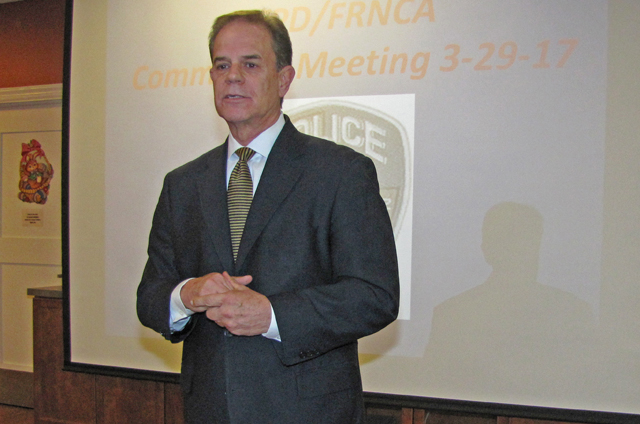There’s a new police chief in Southampton Town

Incoming Southampton Town Police Chief Steven Skrynecki discussed immigration, opioid addiction and improving community relations during a recent meeting in Flanders.
Mr. Skrynecki is currently working on a consulting basis until mid-April, when he formally becomes chief. He said he plans to hold additional meetings throughout Southampton Town and hopes to hear feedback from the community.
Mr. Skrynecki, 64, is a 42-year veteran of the Nassau County Police Department and was the department’s chief when he was hired by the Southampton Town Board last fall. His start date has been pushed back several times and he is still on administrative leave from Nassau County, officials said.
The two-hour meeting on March 24 touched on a number of topics, including data-driven policing methods.
Intelligence-led policing
Mr. Skrynecki said there’s “no need to change anything” as far as the employees in the police department, but there’s room for improvement in how they’re deployed.
In the past, he said, the goal of police departments and municipalities was to have officers everywhere.
“But budgets don’t support having cops everywhere,” he said. “It’s impractical and wasteful to have a cop on every street.”
He noted that “about 10 percent of the population is responsible for about 90 percent of the crime.”
Using what he termed “intelligence-led policing,” departments can get more accurate crime reporting and analysis to determine where crime has been happening and put officers in special units like the Community Response Unit in those spots.
Involving the community
Improving relations with the community is another of Mr. Skrynecki’s goals.
This, he said, involves reintroducing the Citizens Police Academy, a 12-week program that allows participants to experience what it’s like to be a police officer. The program including drills involving situations like when to shoot and not shoot.
“This will give people in the community a good sense of what our job is like,” he said.
The Explorers program, which is already in place, involves educational programs on law enforcement for young adults.
Starting community watch groups and establishing a community/police contact person are also being considered, Mr. Skrynecki said.
The latter initiative would allow residents to email the contact person about a police-related issue, who could then contact an officer in the field on the status of that person’s concerns.
Immigration
The controversial subject of immigration policies also came up during the meeting.
Police want to avoid a situation in which a woman is assaulted or raped but is afraid to go to the police because she’s not a U.S. citizen and might be deported, Mr. Skrynecki explained.
“We don’t want to go down that road,” he said. “We also want people to feel comfortable with working with police if they have information on a crime,” but may not be a citizen.
“That being said, there are some people who are non-citizens that come to us by committing a crime,” he continue.
In these cases, he said, a background check is done for the safety of the officer, if there are criminal warrants out on the suspect or if they are wanted by the federal Immigration and Customs Enforcement agency.
Agencies work together, but the department’s discussions with ICE are limited to criminal activity, Mr. Skrynecki said.
“Sometimes, if the offense is of a minor nature, we will release them on a desk appearance ticket,” he said.
The Southampton department currently has some Spanish speaking officers, but not a lot of them, Mr. Skrynecki said. The department does, however, have access to a program called Language Line, which can translate into many languages.
Opioid addition
The department wants to make people more aware of the dangers of opioids and how easy it is to become addicted to drugs like OxyContin and heroin, the incoming chief said.
All of the department’s patrol cars are equipped with NARCAN, which can quickly revive a person who has overdosed, but the concern then, Mr. Skrynecki said, is whether that person will continue using drugs, knowing that NARCAN is available.
He plans to work with the schools on drug abuse education programs.
The Southampton police also work with agencies like the Suffolk County District Attorney’s East End Drug Task Force, which recently concluded a two-year drug trafficking investigation on the East End by making 32 arrests and seizing seven kilos of heroin and cocaine, five loaded firearms and about $250,000, Mr. Skrynecki said. A good portion of that investigation was centered on Flanders, Northampton and Riverside, he said.
Send criminals back home?
Southampton Town Supervisor Jay Schneiderman said that when criminals are released from the county jail in Riverside, they are not transported back to where they came from, so many remain in the hamlet.
He asked if there were anyone to take those prisoners back to their original hometowns.
Mr. Skrynecki said he’s spoken with the sheriff’s department about this and admitted that “there is some room for improvement here.”
But he added that he’s not going to tie up an officer’s time by assigning him to take someone back to Amityville.
“From my perspective,” the supervisor countered, “the greater cost is having them in the community.”
More officers?
Ron Fisher, president of the Flanders, Riverside and Northampton Community Association, said a recent study indicated that the Southampton department was understaffed and asked if Mr. Skrynecki agreed.
He replied that he’s looking at staffing levels, but hasn’t decided if more officers are needed. He reiterated that having a cop on every corner isn’t necessarily better.
Photo: Southampton Town Police Chief Steven Skrynecki at a March 24 public meeting in Flanders. (Credit: Tim Gannon)









